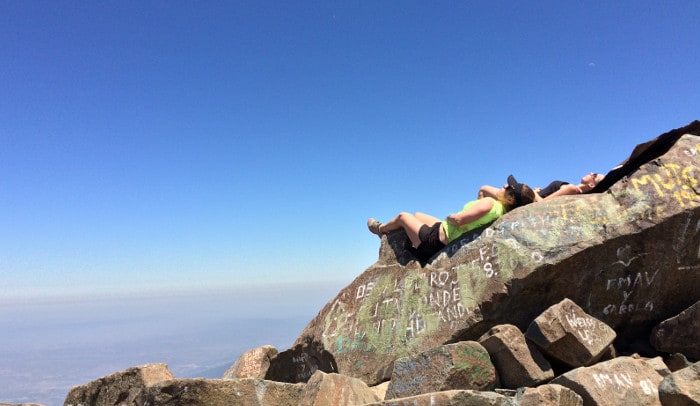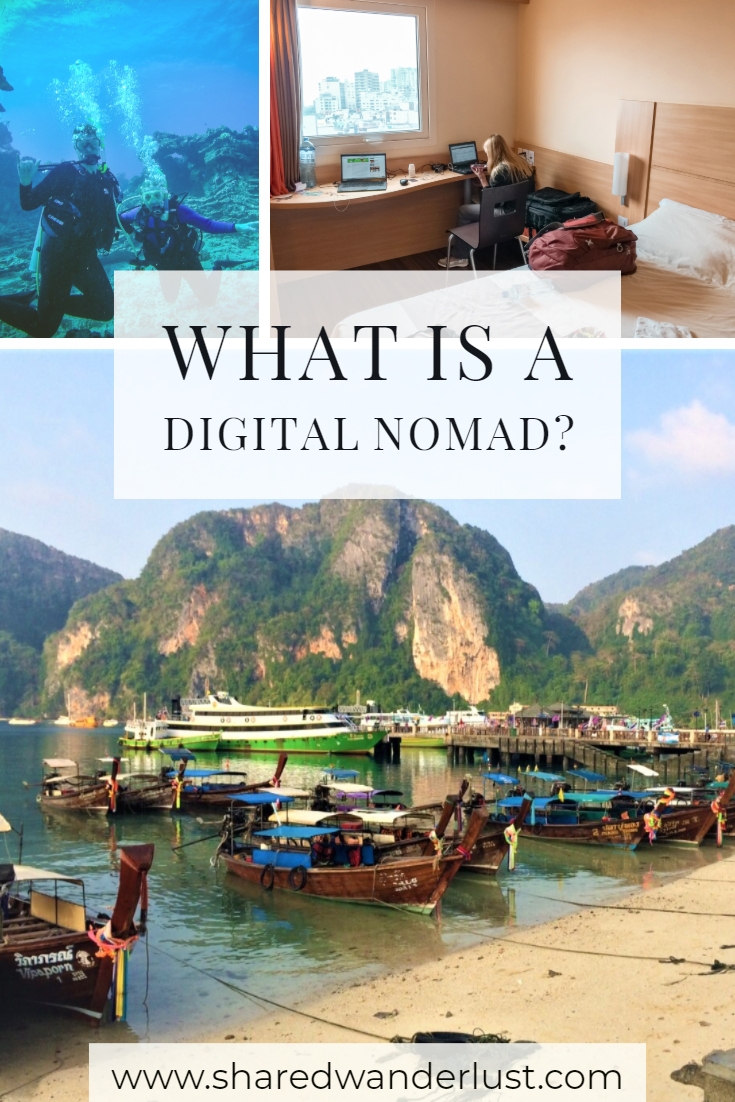I have never gotten more blank stares than when I tell people that I’m a digital nomad. The questions answered in this FAQ-like article are made by me because people just can’t comprehend what it is we do. If I included only questions I’ve gotten, this page would be blank. Just like the stares.

What is a digital nomad and what are our lives like?
A digital nomad is someone who is location independent and makes their living over the internet. Typically the name digital nomad implies that the person moved to another country, but this doesn’t have to be the case. Anywhere there is an internet connection, there could be a digital nomad. Even the south pole in Antarctica has internet!

So you sit on the beach all day and type?
No, but we could! Though I’m not a huge fan of sunburn. I’m delicate.
Our office looks a lot less glamorous than you might have imagined. We sit in our hotel or airbnb room holding conference calls and typing. The difference is that when we go out of the office for a walk, we go see miles of temples, Inca ruins, a movie set, or stay home and get a great bottle of wine.

How much do digital nomads work?
This greatly depends on the digital nomad. We’ve met some people who work 70-80 hour weeks, and some who work 10 hour weeks.

Did you save up a lot of money?
This is a question we actually do get a lot when we tell people we are traveling for a year. We have money saved for taxes and emergencies, but nothing we wouldn’t have had at home.
Some nomads do save up money, move to a very cheap location, and start building their business where their money goes a lot farther.
How much do digital nomads make?
All over the board. Some people aim for the bare minimum and just want to live comfortably in cheap countries while others use the lower expenses of other countries to build their empires.
The minimum would be to make ~$1K per month, but we’ve also met others who make well into six figures. Personally, we do well for ourselves as we keep only higher value clients. The minimum of $1K necessary could be lower, but we are assuming a good lifestyle in a country like Thailand with room to cover emergency spending.
What lifestyle do digital nomads lead?

This depends on the country where the nomad lives. Generally, digital nomads move to cheaper countries so you can live better than back home and/or save money.
For example, a digital nomad can make New York City money while living a cheap life in Bangkok. You’d have to really try to spend more than $1K/person per month in Chiang Mai with $2 meals and $20/night hotel rooms. A $100K salary doesn’t go very far in NYC, but you wouldn’t know what to do with all your money in Thailand.
We’ve lived on the beach or on islands for $20-$30 per night ($600-$900 per month). That’s cheaper than living in the frozen tundra of Minneapolis! Most digital nomads hop around until they find somewhere particularly attractive. When that place stops being attractive, they move on.

What type of jobs do Digital Nomads do?
Any job that doesn’t require physical presence can be a job done remotely. Think about it: did you really need to be at that meeting, or would a conference call have worked just fine? I shake hands at meetings just to justify why I drove across town for something that could have taken a phone call.
Here is a list of some of the more common digital nomad jobs:
- Online marketer: SEO, SEM, Affiliate, Social marketing, blogger
- Content creator: digital creative, writer
- Entrepreneur: building businesses in low cost of living countries to reduce risk
- Poker player
- Programmer
- IT administrator
There are others, but these are the most common. I’ll point out what might not be obvious: these are the black sheep jobs of the modern world.
Online marketing is very new. You can’t get a degree for PPC or Facebook advertising. As such, these professions have a reputation of being filled with scam artists and people with questionable qualifications.
Content creators are usually seen as “artistic”. The connotation with that is usually unreliable and/or out of touch with reality.
Entrepreneurs are those people who are deliberately outside of society. I hate the term, but to use a silly word that is en vogue: they are “disruptors”. They are trying to create a shift in the status quo and thus will be doing things that look odd to the rest of society.
Poker players naturally operate in a weird space. The average person believes it’s not possible to win money at all in online poker, and the thought of doing it for a living has baffled everyone I met when I told them I did it for a living (once upon a time).
Programmers and IT administrators might not seem like black sheep in the corporate world, but tech people are… different. For example, once place that I loved to work had our department stashed in the back of the office where we could close all the doors and windows and turn the lights off while we worked listening to death metal. So great.
What does this have to do with being a digital nomad? You’re going to be an outsider. You will be weird. Your job will be weird. Just roll with it.
How did the Digital Nomad life get started?
Slowly! Despite being able to communicate across the world for a few decades now, the technology still wasn’t there until the mid-2000’s for companies to reliably allow remote working. Or the internet infrastructure hadn’t improved enough in developing countries.
Tim Ferriss popularized the “lifestyle design” movement in his opus, The 4-Hour Work Week. It describes how to create internet-based income, use digital tools to drastically lower your time spent working, and prioritize your life for maximum results. It’s a great book and we highly recommend it for learning time management techniques if nothing else.
Digital nomadism is becoming more mainstream. Over our trip, we meet people who are actively putting these lifestyle design choices into action. We’ve met bloggers, IT admins, photographers, entrepreneurs, and more, all working remotely.
Is it easy to get a Digital Nomad job?
No. It’s still very new, and new things are always met with resistance. And it’s absurd how people will fight you all the way.
One client I have I hadn’t seen in person for a year and a half even though I was only 40 minutes away. Over that time I did large upgrades and transitions and everything was just dandy. But the second I mention we’ll be leaving the country, they pooped themselves.
But just because it isn’t easy doesn’t mean it’s impossible. It’s only hard because there’s no true instruction manual. If you want to do it and work consistently at it, I believe most people could achieve it. As the world becomes even more digital, I only expect it to get easier as well.
How do I get a Digital Nomad job?
- Turn your current job into a remote working job
- Create passive income that will allow you to manage it remotely
- Get a digital job that allows working remotely
#1 is vastly underrated and I think is the best option for most people in a typical professional job. The 4-Hour Work Week describes how to do this. The reason I think this is the best option is because #2 and #3 are basically career changes into something so different that most people would get discouraged.
Creating passive income doesn’t have to be as daunting as it sounds. Saving and buying a profitable online property is one option, as is investing in real estate or dividend-paying stocks over a period of 5-10 years. While that might sound like a long time, being a digital nomad is a lifestyle: we are doing this for the long term. The average person has 40+ years in their career, why not spend 25% of it to create a dream scenario for the remaining years?
Most digital nomads are freelancers and/or entrepreneurs. This is not a life that everyone will enjoy. Creating value and managing all the risk takes a lot of getting used to. For example, once upon a time Alicia was very freaked out about taxes. Tax time for entrepreneurs and freelancers is very stressful as the government demands silly amounts of money. Did you know your income tax rate could go from 20% to 50% in a single year? We found that out when the tax man said we owed infinity billion dollars on year.
And lastly, getting a digital job that allows remote work is last on the list for a reason: high competition for very few spots. Since it’s a remote job, the people in competition for that job explodes.
Would you go back to a typical 9-5 job?
Oh sweet Jesus, no! No! NO! NOOOoOOOOoOoOOoOOoOOOOO!
Don’t you miss some things about being back home?
Yes.
We mostly miss the people. In hindsight, leaving for a year straight wasn’t well thought out. Why couldn’t it have been two separate 6 month trips? We’ll be back more in the future.
We’ve actually started to eat Western food once a week or so as the body starts to crave it. This is more difficult than you think. When we got to Istanbul, we devoured one thing that was on both our plates: carrots. Simple carrots. But coming from a month in Japan, they didn’t have a lot of vegetables with their dishes. It was mostly meat, rice, and bean sprouts. Cheese is also rare in South East Asia, so after several months living there Greece better keep an eye on their feta supply. Because we are hungry.
Routine is also something we miss. Figuring out a new location is exciting but draining. We’d be able to accomplish more if we stayed in a single location longer. Our future travels will have us lingering back home in Minnesota for a time punctuated with travels abroad for several months at a time.
Hair cuts. Think of how women can have their day ruined by their hairdresser they’ve gone to for years. Now picture what could happen when getting your hair cut by someone that doesn’t speak your language, doesn’t cut your type of hair, and isn’t familiar with your styles. Alicia’s hair is getting mighty long!
Western bathrooms. I’m not surprised the world doesn’t poop and shower exactly like the US does, but I am surprised at how terrible some countries’ bathrooms are. Squat toilets and wet bathrooms are just gross and really need to be eradicated.
If you have any questions about digital nomads and/or our lifestyle, leave them in the comments and we’ll answer them
But right now, I need to go take a tour of the Bosporus straight. Who knows when we’ll be back to Istanbul?
Pin it for later!

Interested in becoming a digital nomad or simply want to travel more and spend less time in the office? Check out The 4-Hour Work Week on Amazon.


HAPPY NEW YEAR 2016 !LET NEW ADVENTURES BEGIN 🙂
FOLKS FROM BRAAVOS APARTMENT ŠIBENIK 😉
John/Alicia,
The Digital Nomad life would be great and all (which I’d love to become BTW), but how does one go about attracting clients/customers? Especially those of high value. I can build websites, social media, local directory listings, etc. but stuck on the acquisition of customers… Any pointers?
Author
Sure thing! I wrote a lot in a Reddit AMA about getting clients.
If you’ve been working in an office for a few years, your network is larger than you think. It only takes a few clients to get going.